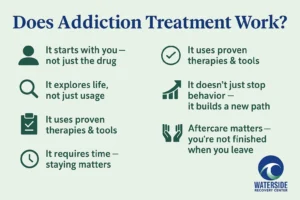You’ve arrived at a crossroad.
You’ve shouldered your fears, wrestled with your doubts, and maybe you’ve already whispered the question: “Does treatment really work?”
At Waterside Recovery in Plymouth County, MA, we believe it does. But more than that, we believe you deserve to understand how and why it works—so that when you walk in the door, you’re not just hoping it helps. You’re choosing it because it makes sense.
Here’s what research and experience tell us about effective drug addiction treatment—and how you can recognize it in the real world.
It Starts With You—Not Just the Drug
Effective treatment begins by seeing you—not only your drug use. The science is clear: addiction affects the brain, the body, the relationships, the job, the sleep, the mood. Treatment that ignores those pieces misses half the map. (Drexel Medicine)
That means when you walk into a program you should feel seen beyond the symptoms: your history, your mental health, your ambitions, your world.
If you find a team that listens to: “I’m using to deal with anxiety,” or “I feel stuck and numb more than wired and high,” you’re in the right place. They aren’t just chasing the usage—they’re chasing the life behind it.
It Explores Life, Not Just Usage
Many people think the goal is simply: stop using. And yes—that’s part of it. But the difference between stopping and thriving is huge.
Effective treatment helps you learn how to live when you’re not using. Research shows treatment outcomes improve when therapy addresses multiple domains: psychological, medical, vocational, legal, familial. (aaaceus.com)
This means you’ll work on triggers and cravings, yes—but you’ll also work on your sleep, your job, your relationships, your identity. You’ll learn not just to quit a habit—but to build a life.
It Uses Proven Therapies & Tools
Knowing that addiction changes the brain means the tools must match the challenge. Effective programs use therapies backed by research—cognitive behavioral therapy, motivational interviewing, group work, sometimes medication. (CDC)
At Waterside you should feel: “Here’s a strategy. Here’s a tool. Here’s practice.” Not: “Just show up and hope it works.” A good program will help you say: “I’m not just someone trying not to use. I’m someone learning to live differently.”
It Requires Time—Staying Matters
One of the most consistent findings in the research: staying in treatment long enough matters. Not just showing up one week, but giving the process space to work. (American Addiction Centers)
Think of it like healing a wound: you don’t stitch it and walk away—there’s care, monitoring, recovery.
So when you meet a program, ask: “What’s the realistic length of time? What happens after day 30, day 90, day 180? How do I keep going when the initial phase ends?”
Your commitment matters—but the program’s structure should help you commit.
It Doesn’t Just Stop Behavior—It Builds a New Path
Stopping drug use is necessary—but not sufficient. The better question is: What do you do when the urgency is gone?
Effective programs help you build new patterns, new interests, new rewards. They don’t just extinguish the fire—they rebuild the house. Research shows one of the core principles is goal‑direction, structure, support, and alternative rewards that compete with substance use. (butler.org)
You’ll learn to handle a trigger, yes. But you’ll also learn to say: “This is meaningful. This is mine.”
Your life doesn’t shrink to “not using.” It expands into “using my time in ways worth it.”

Aftercare Matters—You’re Not Finished When You Leave
Leaving the intensive phase of treatment isn’t the finish line—it’s the beginning of the next wave.
Programs that are truly effective build in continuity: peer groups, outpatient therapy, community connection. (Recovery Research Institute)
Ask: “What happens when I go home? How will I stay connected? What supports are in place?”
Because your life outside the treatment setting is where the program proves itself.
It Treats Addiction Like a Health Condition—not a Moral Failure
If you’re reading this, maybe you already feel shame or guilt. Maybe you’ve heard: “You should’ve been stronger,” or “You made this mess, now clean it up.” The science disagrees. Addiction is a disorder—a chronic one in many cases—and treatment works when we treat it as such. (National Institute on Drug Abuse)
That perspective changes everything: it means you are not broken beyond repair. It means you deserve care. It means this can be different.
When you find a program that treats you like a person, not simply a liability—you’ll feel the difference.
Recognize the Signs of Quality Care
Since treatment is only as good as the program delivering it, here are signs to look for:
- An intake that asks detailed questions—not just about what you used, but about how you live.
- Flexible plans that account for your job, your family, your strengths.
- Therapists who say, “Tell me about your world,” not “You have to stop doing X.”
- Built‑in check‑ins and aftercare—so your progress doesn’t vanish when you leave the building.
- Data and openness: “Here’s how we help. Here’s what you’ll learn. Here’s what happens after.”
- Staff who believe you. Not judging you. Not expecting perfection. But believing in capacity.
If you see these, you’re looking at effective treatment—not just a promise.
Frequently Asked Questions
Q: Will treatment really work for me?
Yes. The research is clear: effective drug addiction treatment leads to improvements in substance use, social functioning, mental health outcomes. (NCBI) The key is finding the right program, staying engaged, and applying the tools. It doesn’t mean you’re guaranteed never to struggle—but it does mean you have a much stronger chance of change.
Q: Do I have to go inpatient? Could I do outpatient?
Not necessarily. It depends on your situation: how much risk, how much use, how much support you have. Effective programs exist on many levels. The important thing is that the program fits you right now—not what others think you should choose.
Q: I’ve used for years. Is it too late?
No. While early intervention is best, effective treatment still works after long periods of use. Addiction’s duration isn’t the disqualifier—what matters is readiness, fit, support, and plan.
Q: What should I ask when choosing a program?
Ask: “How is the treatment plan custom for me?” “What therapies do you use?” “What happens after the main phase ends?” “How will you help me rebuild my life—not just stop use?” When these questions are answered clearly, you’re in good territory.
Q: What if I’m scared it won’t work again?
That fear is normal. It’s part of the process. But if you stay present, engaged, honest, the odds shift in your favor. Think of this not as coming in because you failed—but coming in because you’re choosing something better.
You’ve already made a courageous move by reading this. The next step is reaching out.
Call (866) 671‑8620 or visit our drug addiction treatment services in Plymouth County, MA to learn more. You don’t have to walk this alone—and you don’t have to hope you’ll get help. You can expect it.
You’re ready. Not because you’re perfect. Because you know: something must be different. Something can be different. And you deserve that change.


